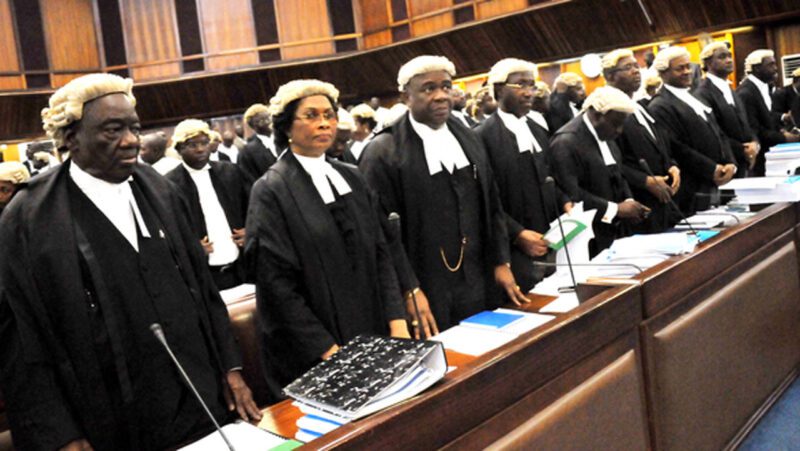Breaking News
Nigerians Fault Executive Influence as Reactions Trail Tinubu’s Warning on Judicial Corruption
Legal experts, activists, and analysts react to President Tinubu’s warning about perceived corruption in Nigeria’s judiciary, blaming executive control, political interference, and systemic decay. Calls grow for full judicial independence, financial autonomy, and structural reforms.

Amid growing concerns about integrity within Nigeria’s justice system, citizens, legal experts, and activists are reacting strongly to President Bola Tinubu’s recent admission that the judiciary is widely perceived as corrupt and that “justice must never be for sale.”
The renewed national debate follows earlier remarks by retired Supreme Court Justice Musa Dattijo Muhammad, who in his October 2023 valedictory speech lamented that the judiciary had deteriorated into “something else”—far from the institution he joined decades earlier. He said he was leaving the bench “a sad man,” warning that corruption and internal decay had eroded public trust.
Speaking at the All Nigeria Judges Conference in Abuja last Monday, President Tinubu acknowledged similar concerns, saying corruption within the judiciary threatens the “core” of the nation. “Justice must never be for sale, and the Bench must never become a sanctuary for compromise,” he said.
Many Nigerians now believe courtrooms—especially in political cases—have become arenas where politicians can manipulate outcomes, further deepening public skepticism. Analysts argue that the executive’s financial influence over the judiciary—including the provision of houses, cars, and other incentives—creates unhealthy dependency that undermines independence.
Across the country, lawyers, civil society leaders, and former judicial officers have offered diverse perspectives on how the crisis can be addressed. While some blame excessive executive control, others point to societal decay and systemic corruption that inevitably shapes institutions.
“Judiciary Must Be Freed From Executive Grip” — Murtala Abubakar
Murtala Abubakar, President of the Arewa Defence League, said Tinubu’s admission must trigger real reforms, not “mere rhetoric.”
He argued that judicial independence is impossible without genuine financial autonomy:
“This independence is a farce when the judiciary is financially shackled to the executive.”
He called for:
- Direct budgeting for the judiciary
- Restructuring of the NJC
- Transparent judicial appointments
- Lifestyle audits of judges
- Anti-corruption action targeting both judges and politicians
- Election reforms to reduce the judiciary’s heavy role in political disputes
“Reform Must Begin With Society Itself” — Anthony N.Z. Sani
Former ACF Secretary-General Anthony N.Z. Sani said corruption is deeply embedded across society, not just the judiciary.
He said Nigeria glorifies wealth without questioning its source.
According to him:
“Meaningful reform must go beyond institutional adjustments to a deeper societal transformation.”
“Judiciary Must Cleanse Itself” — Iniruo Wills
Legal practitioner Iniruo Wills blamed the judiciary for failing to confront declining public confidence.
He said:
“It is utterly naive to expect the Executive… to ensure independence of the judiciary.”
Wills insisted that judges must actively purge the system of “rotten eggs.”
“Executive Pays Lip Service to Judicial Autonomy” — Uwemedimo Nwoko
Former Akwa Ibom Attorney-General Uwemedimo Nwoko argued that constitutional financial autonomy exists on paper but is routinely violated.
He said governments claim to support judicial independence while withholding funds:
“What they say is radically different from what they do.”
He also accused lawyers of aiding judicial compromise:
“It’s the lawyers that work for politicians that are corrupt.”
“Corruption Is Systemic” — Miakpor Emiaso
Retired judge Miakpor Emiaso said the judiciary mirrors the wider society.
He noted:
“You appointed people from a corrupt society to man the judiciary and expect them to become saints?”
He said long-term reform must focus on early childhood education and value reorientation.
“Take Appointment Powers From the Executive” — Polycarp Aande
Former NBA secretary Polycarp Aande argued that judicial corruption cannot end until the judiciary becomes fully independent of the executive, especially regarding appointments.
“Once appointments are controlled by the executive, the appointees naturally become loyal to the executive,” he said.
“Financial Autonomy Is Key” — Blessing Adima
Activist Blessing Adima said judicial independence is impossible without financial autonomy.
He warned politicians who compromise judges to “desist.”
“Tinubu’s Comment Should Trigger Action” — Eric Omare
Minority rights activist Eric Omare described the president’s statement as a “wake-up call,” adding that judicial stakeholders must push harder for financial independence.
“Judiciary Must Reinvent Itself” — Elder Joseph Ambakederimo
South South Reawakening Group convener Ambakederimo criticized recurring “empty rhetoric” from judicial conferences and questioned the need for executives to provide welfare packages for judges.
“Judiciary Is No Longer Seen as Last Hope” — Alagoa Morris
Environmental activist Alagoa Morris said the judiciary must confront its moral crisis to regain public trust.
“Executive Gifts Are Another Form of Corruption” — David West
Bayelsa CLO chairman David West argued that cars and houses from governors compromise judicial neutrality.
“He who pays the piper dictates the tune,” he warned.
“Judges Must Reject Executive Gifts” — Dr. Omenazu Jackson
Jackson said the judiciary must enforce constitutional financial autonomy and reject executive influence.
“Judges’ Welfare Should Be a Right, Not a Favour” — Femi Aborisade
Human rights lawyer Femi Aborisade said judges’ welfare must be budgeted and treated as an entitlement, not a discretionary gift.
He called for sanctions on both givers and recipients of such “favours.”
“Executive Control Undermines Judicial Independence” — Olowolayemo Daniel, Others
Other analysts argued that:
- Executive control over judicial funding weakens independence
- Incentives should be institutional, not tied to political goodwill
- Public trust will not be restored until systemic reforms are implemented
Opinion Nigeria News










